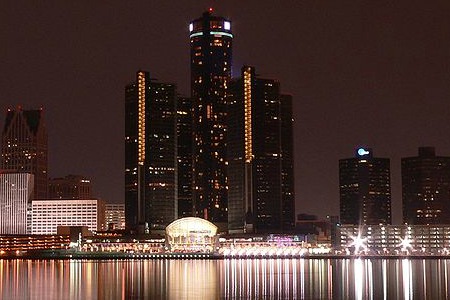
The Kresge Foundation has pledged $150 million to aid in the implementation of a long-ranging, comprehensive framework for Detroit’s future. The Detroit Future City plan, which paves the way for the city’s evolution over the next 50 years, will get a jump start with the Kresge Foundation’s five-year gift announced Wednesday.
CEO Rip Rapson announced the donation at press conference held by Mayor Dave Bing to unveil the Detroit Future City plan, according to the Detroit Free Press.
“It is a fundamental belief on our part that every dollar we spend simply has to reinforce the spirit, the letter and the intent of this plan,” he said.
The Kresge Foundation, along with the W.K. Kellogg Foundation, also committed $3 million on Wednesday to support operations at the project management office for two years.
Created by Bing’s Detroit Works Project, the Detroit Future City strategic plan maps out possibilities to transform the city over the next 50 years, charting paths for land use, neighborhoods, economic development and more. Over two years in the making, Detroit Future City is intended to guide decision-making on change and development in the city over the next 50 years.
Bing first proposed the idea that would become the framework in 2010, as a way of re-envisioning a city plagued by population loss, large legacy costs associated with infrastructure and other long-term financial issues.
“As mayor of Detroit and a longtime member of this community, I’ve witnessed the steady decline of a city with so much promise,” Bing said during the conference. “It became clear to me that business as usual would not effectively transform our city and a new framework for Detroit’s future needed to be developed.”
At the time, he called for downsizing Detroit into between seven and nine different population centers. As much as 45 square miles of the city, or one third of Detroit’s total land, would have been essentially shut down, with city services cut off for any residents who remained. Concerns about service cuts and the administration’s top-down approach sparked a community outcry that eventually forced the Bing administration to re-evaluate their stance.
A reboot of the project — Detroit Works 2.0 — made participation of Detroit citizens and community groups central to the effort. Under the new setup, ideas for restructuring the city were to be based on a combination of community and technical expertise. The project’s civic engagement team held numerous community talks, sponsored a roaming table that engaged people around the city and even created an online game to gather input from citizens. Their work included 30,000 conversations with residents and the gathering of 70,000 survey responses.
Roundtable discussions were also held with businesses, as well as philanthropic groups — who helped foot the bill for the project. In addition to the Kresge and Kellogg Foundations, Detroit Works Long-Term Planning also received financial support from the Erb Family, Hudson Webber, John S. and James L. Knight and Ford Foundations
Acknowledging the challenges Detroit Works faced in establishing its Detroit Future City framework, Mayor Bing noted the wide range of actors involved in its creation at Wednesday’s conference.
“I know that it has been very, very difficult to get from where we were two years ago to where we are today,” he said. “And I think the beauty of this is that we had so many people from so many different walks of life that came to the table to participate because we care for and love this city and its people. “
With the strategic framework now established, it now remains to be seen how Detroit Future City will be implemented. Detroit Work’s steering committee has recommended creating a consortium that could help provide guidance and maintain citizen involvement, but the future of the project will depend on the political will of many different groups and governmental entities.
Detroit’s current financial difficulties, which could lead to bankruptcy or a state takeover, also loom heavy over the venture.
At Wednesday’s press conference, Bing admitted there were challenges ahead, but remained optimistic about the future of the project.
“The work really starts today. We planned for two years. We’ve got a lot of recommendations. We’ve got a lot of data and now we’re ready to move forward,” he said. “Let’s make Detroit great again!”
See the Detroit Works project’s website to review the entire Detroit Future City framework.